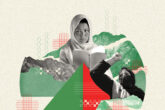September 20, 2022
International Community Must Do More to Protect Human Rights in Afghanistan
Human rights in Afghanistan, especially those of women and girls, have deteriorated sharply during the first year of Taliban rule. The very real prospect of losing a generation of Afghan girls and boys as civil society suffers under the Taliban’s extreme and repressive policies makes finding any possible levers of international influence over the Taliban necessary and urgent—even if few good options exist.
Engagement Comes up Short
Despite the Taliban’s claim that there is peace in Afghanistan, the reality is one of violence and grave threats to basic human rights. There have been over 237 documented extrajudicial killings—including 160 of members of the former Afghan government and security forces—since the Taliban took power in August 2021.1 Following an 11-day visit to Afghanistan in May, U.N. Special Rapporteur on Afghanistan Richard Bennett reported that the Taliban’s policies are creating a society ruled by fear and without regard for basic human rights. He pointed to the banishment of women from public life as particularly disturbing.2
The most evident example of the Taliban’s trampling of women’s rights is its decision last March to go back on an earlier pledge to allow girls to go to school, including those over the age of 12. The closing of schools to girls will lead to higher rates of illiteracy, more child marriages, and higher rates of maternal and infant deaths. The Taliban is also limiting women’s options for earning wages or working outside the home; restricting their ability to leave their homes without a male companion; enabling child marriage; removing cultural, legal, and social protections from domestic abuse; and instituting strict dress codes.
The indoctrination of Afghan boys to extreme religious teachings in madrassas that now proliferate the country will further hasten the reversal of two decades of socioeconomic progress, not to mention contribute to the rebuilding of an international terrorist haven in the country. The recent elimination of al Qaeda’s top leader Ayman al-Zawahiri meets a major U.S. counterterrorism objective and vindicates to some degree President Joe Biden’s claims about the efficacy of “over-the-horizon” counterterrorism operations. But the fact that Zawahiri sheltered in a neighborhood associated with Taliban Acting Interior Minister Sirajuddin Haqqani also demonstrates that the two organizations remain allied and that al Qaeda is likely to take advantage of the Taliban being in power to rebuild its base in Afghanistan. There is a direct connection between extremist trends in the country and the treatment of women and girls, making it impossible to separate the issue of terrorism from women’s rights.
Tolerating the Taliban’s increasingly outrageous behavior should not be an option.
The deteriorating human rights situation occurs in the context of a humanitarian crisis that is complicating the international community’s ability to influence Taliban behavior and policies. The United Nations (U.N.) recently warned that 24 million Afghans still require humanitarian relief—six million of which are at risk of famine—and that more than $700 million is needed to help Afghans get through the coming winter months.3 The acute food security crisis has been compounded by droughts and natural disasters, including an earthquake that struck southeastern Afghanistan on June 22, 2022.
The United States has provided over $750 million in humanitarian aid to Afghanistan since the collapse of the government last year and is seeking ways to use $3.5 billion in Afghan frozen assets to assist average Afghans without lining the pockets of the Taliban leadership. In welcome news, the State Department announced in mid-August that the frozen assets would not be provided to the Taliban-controlled central bank.4 Instead, the Biden administration indicated in mid-September that the funds will be distributed to the Afghan people through an oversight body managed by Swiss government officials and Afghan experts that will be inaccessible to the Taliban.5
A New Way Forward
Rather than rely on continued engagement with a regime clinging to a harsh and barbaric ideology, the United States, in coordination with the U.N. and other like-minded partners, should identify other ways to protect Afghan civil society and basic human rights. There are several ways to try to impact the human rights situation through the U.N. system, including the Security Council (UNSC), Human Rights Council (UNHCR), and the U.N. Assistance Mission in Afghanistan (UNAMA). UNAMA has a relatively strong mandate and should be an important player but has not yet found its voice.
Going forward, the United States, its like-minded partners, and U.N. officials should identify and be consistent about what they expect from the Taliban and what the consequences will be for continuing policies that violate human rights norms and facilitate terrorist activity. For instance, it should be clear that any path toward diplomatic recognition must involve steps to improve human rights, especially those of women and girls. It should be clear that additional targeted sanctions will be imposed on the Taliban unless it improves both its human rights and counterterrorism policies. There must also be careful monitoring and accountability for the provision of humanitarian assistance.
Tolerating the Taliban’s increasingly outrageous behavior should not be an option. In other countries where regimes are brutally stifling the human rights of their citizens—i.e., the military junta in Burma, the Kim Jong Un regime in North Korea, and the Assad regime in Syria—there are international consequences. The United States and international community should apply the same standards for dealing with the Taliban that they apply to other rights-abusing regimes. The Taliban have demonstrated that they will not change their policies based on international engagement alone. It is time to take a more punitive approach that conditions future engagement.
The United States, its like-minded partners, and the U.N. could take meaningful steps, including:
- Suspending direct engagement with the Taliban by Washington-based senior officials, instead using the exiled U.S. Embassy in Doha or the U.N., until there are meaningful and irreversible improvements to human rights, particularly for women and girls.
- Opposing recognition of the Taliban as legitimate rulers of Afghan while they continue to harbor terrorists and violate international human rights agreements.
- Reapply the UNSC Resolution (UNSCR) 1988 travel ban on all Taliban leaders.
- Develop firm redlines and demands regarding human rights and terrorism and add additional names or entities to the UNSCR 1988 lists, as necessary. Investigate the Taliban assassination campaign that took place from 2020 to 2021 against civil society and the media. Ensure UNSC messaging to the Taliban is firm and consistent.
- Conduct more active diplomatic outreach with certain regional actors, particularly Central Asian states, Qatar, India, and Pakistan, to press them to avoid giving the Taliban political recognition and unconditional support in the face of gross violations of human rights.
- Making human rights a focus of sustained foreign policy attention.
- Hold a side event at the U.N. General Assembly in September on human rights in Afghanistan hosted by a member state and powered by human rights groups and the Afghan diaspora.
- Create a new U.S. sanctions regime based on Afghan human rights violations or use the Global Magnitsky Act.
- Provide support and resources to local Afghan groups that monitor human rights abuses and document violations and identify opportunities for them to speak to international audiences.
- U.S. Congress should allocate additional funding for the Special Rapporteur on the Situation of Human Rights in Afghanistan position to give him the ability to report on and protect the status of Afghan human rights defenders.
- The newly appointed U.N. Special Representative of the Secretary-General on Afghanistan and Head of UNAMA Roza Otunbayeva should lead UNAMA in taking bolder action to protect Afghan human rights, improve governance, and resolve disputes among political actors.
- Providing humanitarian relief without empowering the Taliban.
- Prevent the Taliban from accessing the Afghan foreign reserves and instead ensure the funds are available for the benefit of the Afghan economy, while maintaining a strong public narrative that the responsibility for Afghanistan’s collapse, and the options to access international capital, lie with the Taliban itself.
- Develop better accountability mechanisms for humanitarian aid entering the country. The United States should urge the U.N. and World Bank to publicly identify any Taliban interference with humanitarian aid, strengthen existing oversight mechanisms, and make their oversight findings available to the Afghan people. Furthermore, the United States and U.N. should ensure international funding is not going toward madrassas or extremist-oriented religious instruction.
- Continue the U.S. Agency for International Development’s targeted “humanitarian plus” programs, which direct funds through commercial banks to empower women entrepreneurs, small business organizations, and the agricultural sector.
- Provide financial and political support to grassroots youth civil society groups within Afghanistan to combat radicalism and extremism.
- The U.N. should avoid duplicating service delivery that could be more effectively performed by the private sector, and instead comply with UNAMA’s mandated duty to “facilitate commercial and financial activity in Afghanistan” and “support community-based systems for meeting basic human needs and increasing resilience.”
- Encourage Twitter to block all individual and group Taliban social media accounts based on the Taliban’s connections to terrorism, as Facebook has done.
- The Afghan diaspora should engage with policymakers and the media in the countries in which they reside to raise awareness about the realities of what is happening inside Afghanistan and press for stronger international redlines and messaging to the Taliban on human rights and counterterrorism.
Holding the Taliban accountable for the treatment of their own people is the least the international community can do following the abrupt departure of U.S. and NATO forces in August 2021. The United States has undoubtedly lost leverage with the withdrawal of U.S. forces from the country. But it still has cards to play and has a better chance of winning gains for Afghan civil society if it works closely with like-minded nations and recognizes that engagement alone is futile.
Lisa Curtis is a Senior Fellow and Director of the Indo-Pacific Security Program at CNAS and former deputy assistant to the president and National Security Council senior director for South and Central Asia.
Annie Pforzheimer is a non-resident associate with the Center for Strategic and International Studies and former U.S. deputy chief of mission in Afghanistan from 2017–2018.
Jan Mohammad Jahid is an Adjunct Associate Fellow at CNAS.
The ideas and policy recommendations in this commentary are based largely on a private roundtable CNAS hosted on August 3, 2022, with Afghans residing in and outside Afghanistan—including in Pakistan, Tajikistan, Turkey, Europe, Canada, and the United States—along with U.S. experts.
- Radio Free Europe/Radio Free Liberty, "Erosion of Women's Rights, Extrajudicial Killings Plague Taliban Rule, Says UN," July 20, 2022, at https://gandhara.rferl.org/a/afghanistan-women-s-rights-extrajudicial-killings-taliban-un/31951807.html. ↩
- United Nations Press Release, "Facing critical human rights challenges, Afghanistan is at a crossroads, says UN expert in Kabul," May 26, 2022, at https://www.ohchr.org/en/press-releases/2022/05/faving-critical-human-rights-challenges-afghanistan-crossroads-says-un. ↩
- UN News, "UN relief chief stresses need to stay and deliver for all Afghans," August 29, 2022, at https://news.un.org/en/story/2022/08/1125672#:~:text=The%20UN%20relief%20chief%20stressed,have%20seen%20these%20many%20months. ↩
- https://www.nytimes.com/2022/08/15/us/politics/us-afghanistan-funds-taliban.html. ↩
- Jeff Stein, "U.S. to redirect Afghanistan's frozen assets after Taliban rejects deal," The Washington Post, September 14, 2022, at https://www.washingtonpost.com/us-policy/2022/09/14/taliban-frozen-assets-afghanistan-biden/. ↩
More from CNAS
-
A Failure to Plan: Examining the Biden Administration’s Preparation for the Afghanistan Withdrawal
Afghanistan, Iraq, and Vietnam. One failure is a horrible accident; two failures are a tragic coincidence; three failures are a disturbing trend that shows the U.S. government...
By Christopher D. Kolenda
-
Against All Odds
Eighteen months after taking power, the Taliban is intensifying its repression of Afghan civil society and cracking down on the rights and freedoms of all Afghans, especially ...
By Lisa Curtis, Annie Pforzheimer & Jan Mohammad Jahid
-
To Help Afghanistan, Engage Its Political Opposition
The effort to help Afghans shape a better alternative should begin now....
By Richard Fontaine & Lisa Curtis
-
Time to Get Tough on the Taliban
As Washington reduces its diplomatic engagement with the Taliban, it should also focus on finding creative ways to support Afghan civil society...
By Lisa Curtis & Nader Nadery




